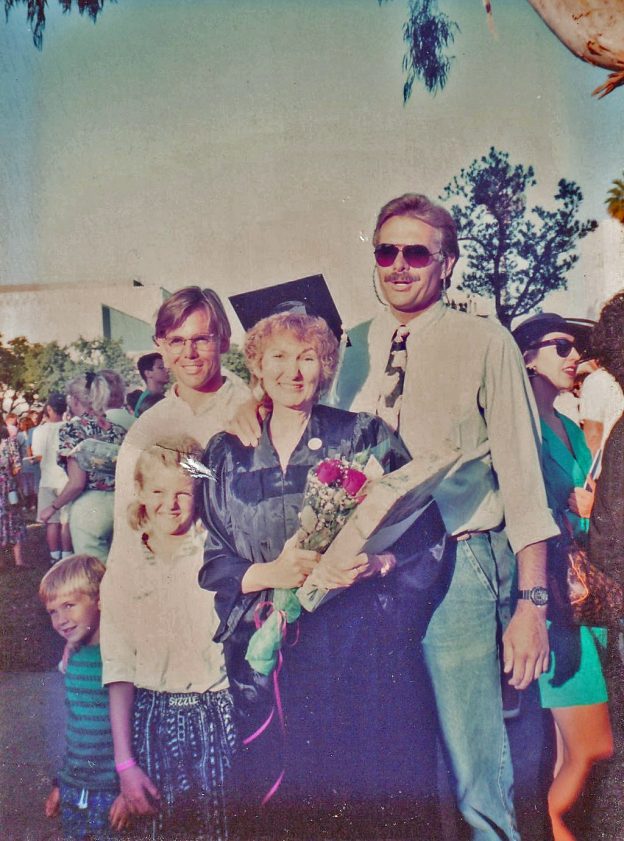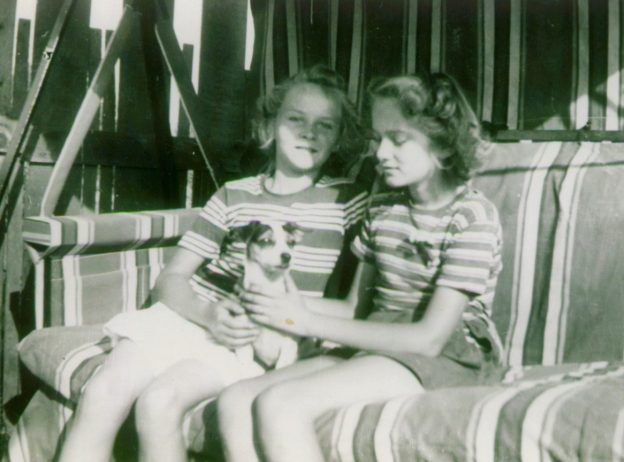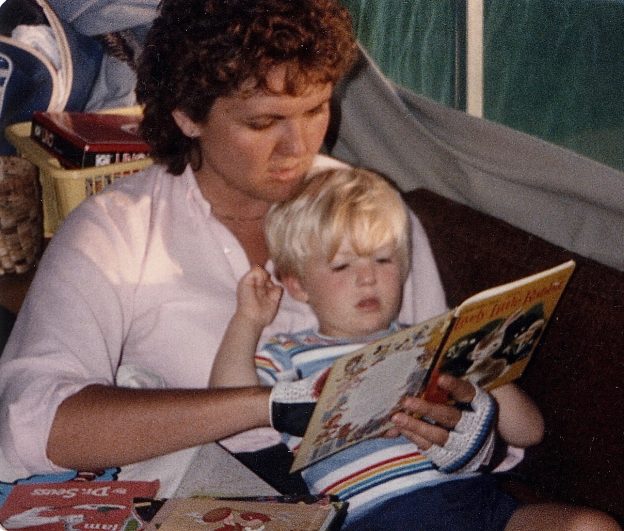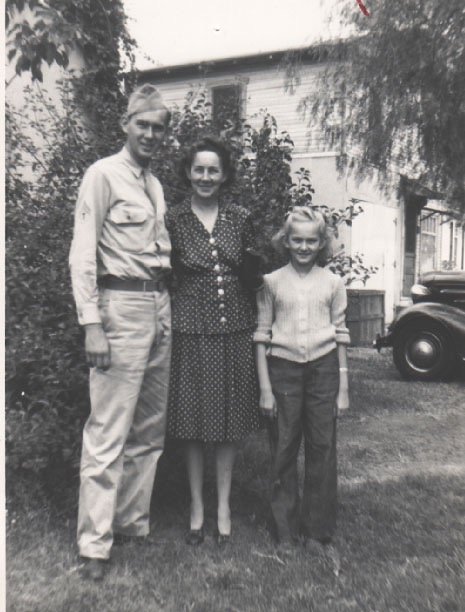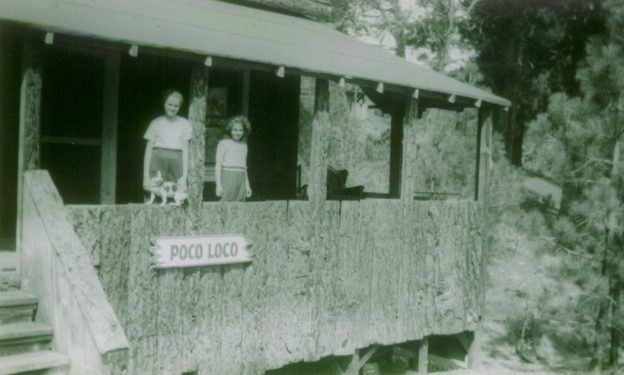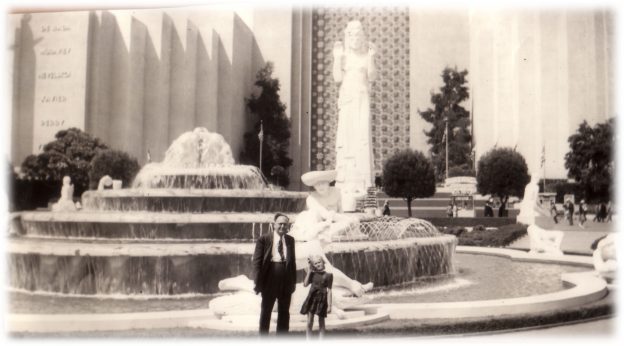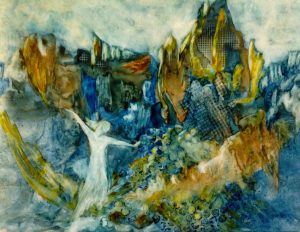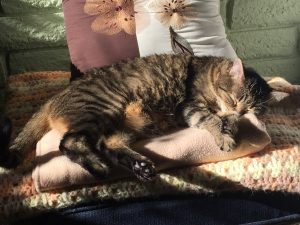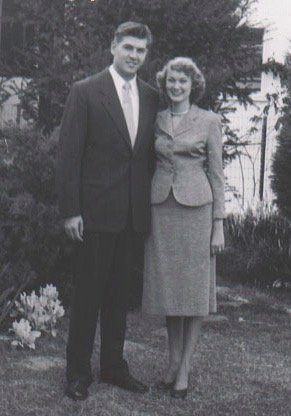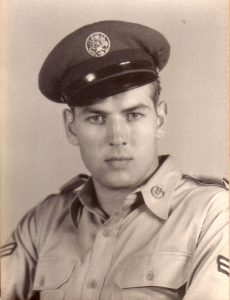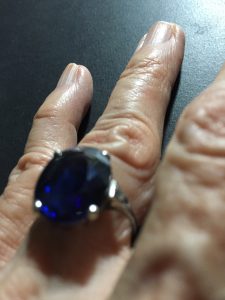Japanese Bomb Pearl Harbor Dec. 7, 1941
It was a Sunday morning and we had our radio on in the background like we always did, (no TV in those days!) and suddenly there was an interruption in the program and the announcement came that the Japanese had sunk many of our ships and destroyed much of Pearl Harbor. We were absolutely shocked to hear that thousands of our service men were killed. I remember feeling very frightened because I saw the fear on my parent’s faces. They had talked about Hitler in Europe and hoped we wouldn’t have to go to war. But now it was different.

Uncle Sam Wants You!
My brother and his wife came over and also my sister and her husband. Our family sat huddled around the radio for the entire day talking about what might happen next. Could the Japanese get as far as Calif.? I remember my brother who was 22, saying he was joining the Army and I was afraid for him. It’s a day I will never forget.
Bud fought in France and Germany and then was on his way to Japan when the Atomic Bomb was dropped and Japan surrendered. He was lucky to have lived through it all without being wounded. I wrote to him and remember feeling very worried about his safety. It was very cold in France so I started knitting a khaki colored scarf for him. I just kept knitting until it was very, very long! When he received it he said he loved it because he could wrap it around his neck a lot of times to keep warm. He sent me a little charm from a city called Toule in France for my charm bracelet. All the girls wore charm bracelets and kept adding more charms to them.

Save Rubber
Patriotism
We knew there was a war going on in Europe with Hitler trying to take over all the countries, but it was such a shock to learn that Japan wanted to do the same thing. A few days after Pearl Harbor, President Franklin D. Roosevelt, declared war on Japan and also Germany. Everyone’s life in the U.S. changed after that. All the young men were anxious to defend their country and everyone pulled together to help in any way they could. It was a very patriotic time when people were proud of their country and knew we could defeat the enemy. No one opposed the war because we knew if we didn’t fight, our country could be next.
The war years were very patriotic years. Everyone wanted to do their part to help the war effort. I remember saving tin foil from gum wrappers and forming it into a ball and then turning it in at a collection box at school. They took the aluminum foil and melted it down to make aluminum for airplanes. We also saved anything rubber to help make rubber tires for the vehicles. To help our country financially, everyone bought savings bonds. The money was used to help our country fight the war.

Food Ration Stamps

Gas Ration Book
Rationing
I also remember food and gas rationing. Everyone used less so our soldiers would have plenty of food and gas for their trucks. Each family received a coupon book for the month. We couldn’t buy butter so we bought oleomargarine. It was sealed in a plastic pouch and was white. There was a little capsule of food coloring inside and you popped it and then massaged the oleo until it turned yellow. I loved doing it.
Sugar was rationed too so we didn’t have many desserts or cookies. Gasoline was rationed and people had a hard time getting back and forth from work. Everyone had Victory Gardens in their back yards. We grew vegetables and had chickens for the eggs. Everyone used less so our soldiers could have plenty of food and gas for their trucks. I never remember anyone complaining about doing without. We were so proud we could do our part for the war effort.
Our Family
Since we lived near the Pacific Coast, we heard that our government had placed large anti-aircraft guns up and down the beaches along our coastline. My older sister who was 24, volunteered to help out by driving trucks to the different gun locations where the soldiers were, and giving them supplies and coffee and cookies.
I remember my mom and sister putting tan colored liquid on their legs instead of nylon stockings. (Nylon was used in the war effort. ) Their legs looked all streaky from the liquid and my sis said she was going to sit in the sun and get a tan on her legs. Tanning your skin became very popular.
 I remember Mom hanging a little flag with one blue star in our window. It meant we had one person in our family fighting in the war. Nearly everyone had a flag with 1, 2 or sometimes 3 stars. If you saw a flag with a gold star, you knew their loved one had died.
I remember Mom hanging a little flag with one blue star in our window. It meant we had one person in our family fighting in the war. Nearly everyone had a flag with 1, 2 or sometimes 3 stars. If you saw a flag with a gold star, you knew their loved one had died.
Air Raids
My dad was an air-raid warden. At night when we heard the air-raid sirens I was always very scared. We never knew if it was for real or just a test. We would pull down all our shades so no light showed and huddle around the radio. Dad put on his uniform and went around from house to house on our block, making sure everyone had their lights off or at least their shades pulled so no light could be seen. That way if Japanese planes came over they wouldn’t be able to see where our cities were. Thank goodness the Japanese never got over to the U.S.
In Southern Calif. there were a lot of defense plants, (factories that made airplanes). The buildings were covered with camouflage netting on the sides and roofs. The roofs looked like tiny farms and farmland from the air, this was done to fool the Japanese so they wouldn’t bomb the factories if they flew over. My dad worked at one of the defense plants making airplanes.

Buy War Bonds
Savings Bonds
To help our country financially, everyone bought savings bonds. The money was used to help our country fight the war. I was in grade school during the war and remember bringing 4 quarters every week to the teacher, and she would give me 4 “savings stamps” that I pasted into a little book. When the book was filled up with $18.75 worth of stamps, we got a “$25.00 Savings Bond”. After the war we cashed in the bonds and received $25.00. So, how much interest did we make on our investment? And how many weeks did it take to fill the book? (This is the “teacher” in me talking now!!)

Plant a Victory Garden
Victory Gardens
Another way we helped fight the war, was by having a “Victory Garden”. We grew a lot of our own vegetables so there would be more food for the soldiers. We lived in Temple City and had a large back yard. I remember watching our carrots, onions and lettuce pop up. It seemed to taste better from our garden. Nearly everyone grew food in their gardens. It was the patriotic thing to do.
We also had chickens. It was my job to feed the chickens and gather the eggs. I loved animals and one of the chickens was my pet. She was white and I named her June. She would sit on my lap next to my kitty, Spicy and my toy fox terrier, Spotty. They all got along fine.
Japanese Concentration Camps
During the first part of World War II when we went to war with Japan, the U.S. government was afraid the Japanese people who lived along the Pacific Coast might be a threat to our country, so they went around and sent all these families to concentration camps. There was a camp at the Santa Anita Race Track up near Pasadena. They closed the horse races and fenced the area and put up temporary houses in the parking lot. I remember looking out the window of our car and seeing children and adults peering out of the fence. I didn’t think too much about it since I was young, but later I felt it was a very unfair thing to do. Nearly all of these Japanese people were born here in the U.S. and were American citizens. They didn’t want Japan to take over the U.S. They lost their homes and property and had a very difficult time after the war was over. There were camps all over the west coast and Bob, my brother-in-law who was an electrician, helped wire many of the camps.
Propaganda Posters
The government published posters instilling hatred for the enemy. By stirring up these feelings, they knew people would respond and help on the national front. I remember in school buying savings stamps and saving aluminum foil so I could do my part to knock out Hitler in Germany, Mussolini in Italy and Hirohito in Japan. We hated them and loved the U.S. It gave us hope that we would defeat the enemy and remain free.
Navajo Code Talkers
After the war we heard the story about the Navajo Code Talkers. When the war was on, the Japanese were excellent decoders and no matter what type of code the U.S. used, the Japanese military could decode it and know what we were planning to do. There were some Navajo Indians in the military and they said the Navajo language was very difficult to decode and only a few people knew their language. There were 29 Navajo Indians at Camp Pendleton here in Calif. who became the ones who sent coded messages the Japanese couldn’t figure out. They helped win the war!
As far as animals helping in the war, many were used. Over 200,000 pigeons sent messages and dolphins were trained by the Navy to use their natural sonar to find underwater mines. I’m sure horses and dogs were used too.
 Women in the Workplace
Women in the Workplace
It was interesting after the war, because women had been the ones working in the defense plants and taking over the jobs of all the men who were away fighting. Many women continued to work. Before then, very few women worked but stayed home as wives and mothers. Women were beginning to become more independent and realize they were strong. No longer were women looked at as the “weaker sex.” In my family, my mom was a smart, strong woman who ran the finances in our family, had her own Beauty Shop with employees and still had time and energy for me.
The War Ends
I remember the day the war was over with Germany in May 1945. Everyone celebrated and ran out to the street happy and excited. A few months later we did it again when the war with Japan was over in Sept. 1945. I knew my brother would soon be home. Life would now return to normal.
 Edelweiss is a rare Austrian flower that only grows at high altitudes in the Alps. When a person picks a bouquet and gives it to loved ones, it brings great joy. And that is my desire with this blog; to bring you joy with a bouquet of memories. creativity and encouraging thoughts.
Edelweiss is a rare Austrian flower that only grows at high altitudes in the Alps. When a person picks a bouquet and gives it to loved ones, it brings great joy. And that is my desire with this blog; to bring you joy with a bouquet of memories. creativity and encouraging thoughts.

